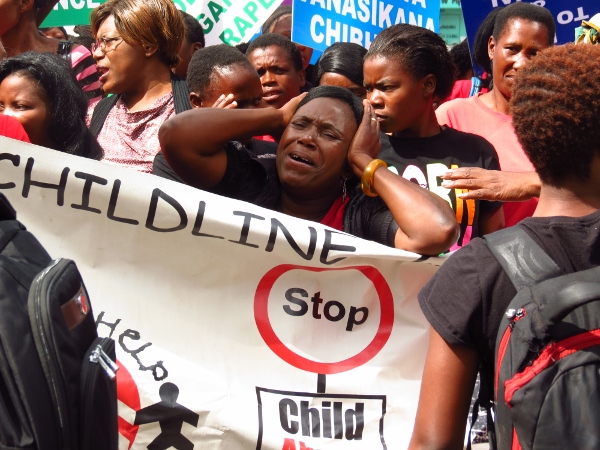“I cannot accept a rose from anyone as long as there’s a woman out there being abused,” was the rallying cry of the hundreds of Zimbabweans that took to the streets to protest against violence against women as part of the global One Billion Rising for Justice Campaign on February 14th. The march that captured the attention of the nation was a vivid example of the creative ways that women are standing up to say enough is enough, even in a country where continued repression makes speaking out dangerous.
The now-annual global One Billion Rising Campaign calls on women across the world to rise up, dance and demand an end to violence against women and girls, and for Zimbabwean activists, the campaign provided the opportunity to sound the alarm about the high incidence of rape women face in their country. At least 15 women are raped in the country on a daily basis, and these estimates are low given low reporting rates.
Wearing striking red clothing and holding their banners high, over four hundred women and men marched the streets of Harare’s city center calling on the judicial system to protect women’s human rights by taking rape seriously. The march was co-organized by the Women’s Coalition of Zimbabwe, and its members, including Musasa, Planned Parenthood Zimbabwe, the Gays and Lesbians of Zimbabwe (GALZ), Katswe Sistahood, and Padare, a men’s group. This protest came in the wake of the conviction of popular preacher, Martin Gumbura, for four counts of rape.
That day, we, the women of Zimbabwe said that we are tired of being abused, tired of taking things lying down, and that we also have the power, the numbers, and the voice to act on issues that are affecting us. ~ Winnet Shamuyarira
The Gumbura case put a spotlight on the increasing pattern of sexual violence committed against women within places that are considered safe, such as faith communities. As Winnet Shamuyarira of Katswe Sistahood warns, “in Zimbabwe, the escalation of violence perpetrated against women and how it manifests especially within conservative religious institutions or spiritualist spaces is a complicated issue.” For example, women are less likely to report a rape committed by someone they value and respect, such as their pastor.
We can’t forget that we are a so-called ‘Christian nation’ according to our state, even our Constitution. This idea has opened many doors for violence against women. There is a rise in religious fundamentalisms where people have stopped questioning. In many ways, religion is an escape or a way out from the day-to-day problems troubling the country. And religious prophets have taken advantage of people in that way. ~ Winnet Shamuyarira
Even when it’s risky to talk openly about a rape committed by religious leaders, women activists are speaking out. JASS partner, Katswe Sistahood works to blow the lid open on many of these complex and taboo issues. Katswe creates safe spaces for called Pachotos—a Shona word that invokes the cultural memory of fireside story-telling—where women gather to share stories and find their voices. Integrating JASS’ Heart—Mind—Body approach, Katswe helps women begin to understand how ‘social issues’ such as rape have affected them physically, mentally, and emotionally, and address the trauma they may have faced. This process not only helps women heal, it builds solidarity among women—regardless of their differences—while transforming them into powerful community change agents speaking out on issues that affect them.


























